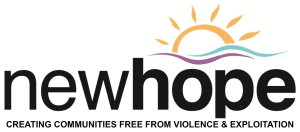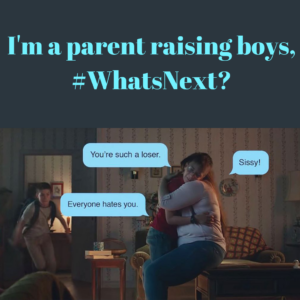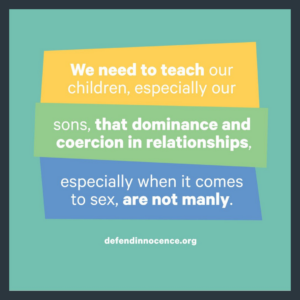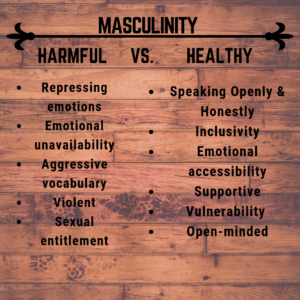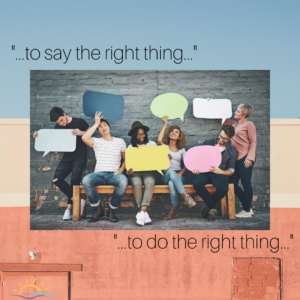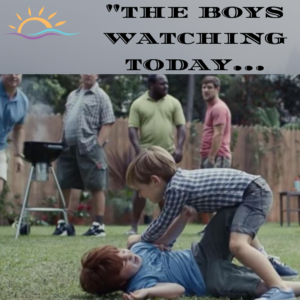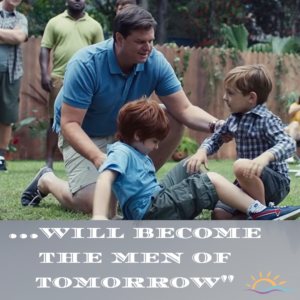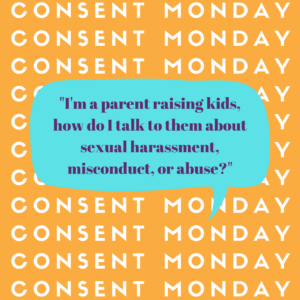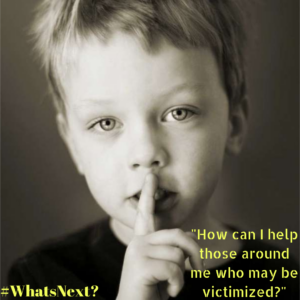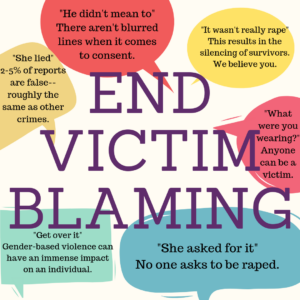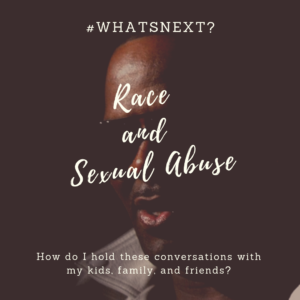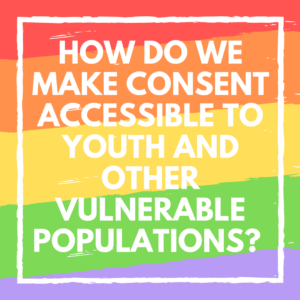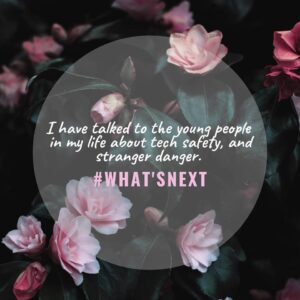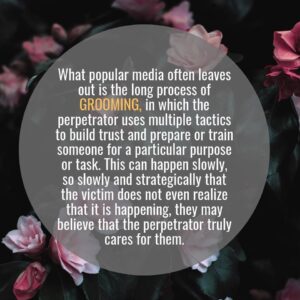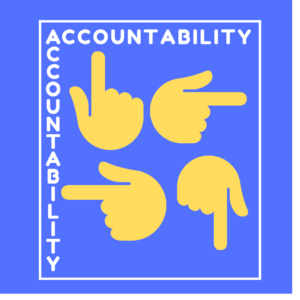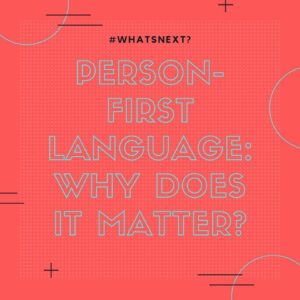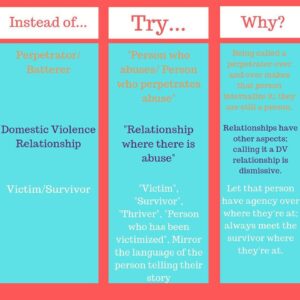#ConsentTalks
April is Sexual Assault Awareness Month (SAAM). In April 2019, New Hope used the theme of #WhatsNext to help teachers, parents, and the community talk about Sexual Violence. This year we have been bombarded with messages around SV. Some of these messages may have left you feeling hopeless, confused, angry… Our hope is to tackle these hard questions surrounding some of the most trending and uncomfortable topics we see in the media in order to help our community talk about these messages and keep the conversation on accountability for people who abuse.
Scroll down to follow our #WhatsNext campaign; all images can be found on our social media (Facebook, Twitter, and Instagram) and we encourage you to share those that speak to you with you friends, family, or community.
We cover 5 topics:
- Gillette’s Commercial on Toxic Masculinity
- “Surviving R. Kelly”
- Human Trafficking
- #MeToo
- Accountability
Topic #1: Gillette’s Commercial on Toxic Masculinity
For our first #WhatsNext topic, will be tackling conversations that may have come up when Gillette released their commercial on toxic masculinity. Toxic masculinity is the cultural ideal of “manliness”, where strength is seen as everything and emotions are seen as weakness. In its simplest definition, it is harmful messaging to boys and men.
I’m a parent raising boys, #whatsnext? Talking about Sexual harassment, misconduct, and abuse can be difficult for many of us. Make positive and empowering gender representations. Identify positive portrayals of males in the media and interpret cultural norms around harmful masculinity. Learn more about your child’s school harassment policies and what is done when sexual harassment is reported. If you feel more can be done to educate other students, find out if there are ways you can get involved.
Click here for a helpful resource tackling talking to teenage boys about Sexual Assault
Did you have conversations around the Gillette Commercial? #WhatsNext? Educate others about gender roles, sexism, and concepts of masculinity by sharing the commercial with family and friends and engage them in conversations about it or by helping to organize an educational forum at school!
Watch the commercial here
Did the Gillette commercial tackling harmful messaging towards boys and men have you wondering “How do I help my son become a good man?” #WhatsNext? Widen the acceptance of what activities and interests boys are allowed to have. Baking, dancing, playing dress up or with dolls, enjoying fashion, being excited about crafts or at home art projects… these are not activities or interests that are feminine or only for women. Allow your sons to explore whatever they are interested in, regardless if what society might expect from them!
Were some men in your life angry at the Gillette commercial for attacking masculinity? #WhatsNext? Use this opportunity to have a conversation about why society associates certain behaviors with certain genders. Think about ways that behaviors and characteristics become gendered and how to disrupt those binary ideas!
Topic #2: “Surviving R. Kelly”
Are you a parent raising kids and unsure how to talk about sexual harassment, misconduct, or abuse with your kids? #WhatsNext Bring up the idea of boundaries! It is okay to say no to hugs and physical touch from anyone.
Did you know the national #SAAM2019 campaign is using the hashtag #IAsk to talk about consent? A great way to find some resources or have conversations around the topic of consent is to follow that hashtag! #IAsk #WhatConsentMeansToMe
Click here for a video on Consent for Kids
Did watching “Surviving R. Kelly” make you ask yourself: “how can I help those around me who may be victimized?” #WhatsNext? Educate about secrets– people who abuse in this way often use secret keeping to manipulate the person who was victimized into keeping their secrets. Tell them you can always be there to talk to them about anything and that they can trust you. Remind them they will never be in trouble for telling you of their experiences.
Did watching “Surviving R. Kelly” make you ask yourself, “what can I do to change the culture and keep accountability in focus?” #WhatsNext? Help change victim-blaming culture by educating folks on where the responsibility lies. There are many messages in society that question victims behavior after abuse has occurred. Try changing the narrative to keep accountability in focus.
Click here to watch “Autocorrect”, don’t ignore the subtext. It’s on us to intervene.
The docu-series “Surviving R. Kelly” connected race and sexual violence- Did that leave you feeling unsure about how to have conversations about race with your children, family, and friends? #WhatsNext? Talking about marginalization can be difficult- remember that if we ignore racial disparities we are ignoring the lived experiences of people of color. Use this opportunity to research and find resources and stories written by people of color, especially survivors. Using these perspectives may help to guide your conversations.
Topic #3: Human Trafficking
Consent is meaningless if it is not accessible. How do we make consent accessible to youth, and other vulnerable populations? The conversation around consent needs to start with talking openly about what it means to be vulnerable and how other people will try and take advantage of those vulnerabilities. Having conversations about what makes us vulnerable will help us to understand agency, which is defined by Merriam-Webster as “the capacity, condition, or state of acting or of exerting power”. Our agency affects our ability to make decisions, which is one way that we exert power. #WhatsNext? Talk to the people in your life about situations where someone else has more power over them. In these situations, it is more difficult to make the choices we really want to make. If someone is older than you, has a lot of money, or a higher rank at work or school all these things can make it harder to say no if that person asks you to do something for them.
Have you been seeing a lot of news coverage surrounding the topic of human trafficking and feel unsure of what it all means? #WhatsNext?
To be able to understand what we’re seeing in the media, we need to understand the dynamics of trafficking and sexual exploitation. Human trafficking can occur in many forms (sex trafficking, domestic labor trafficking, agricultural trafficking) but what they all have in common is that a person or persons are compelled to engage in a type of work that acts to benefit another person for the purpose of exploitation. Human trafficking and sexual exploitation are abuses of power and human rights violations intended to control another person. A person who has been victimized by human trafficking did not consent to being exploited.
Does this question make you ask #WhatsNext? Unfortunately, most people who commit sexual violence do not experience consequences from their crimes – much of which has to do with society’s treatment of survivors, reporting rates, criminal justice response, and court sentencing. Especially right now, “post” #metoo, the question remains, Why do some people get away with committing sexual violence – even when we know about it? The answer isn’t simple, because people get away with all types of sexual violence – from harassing texts about someone’s sexual identities to unwanted nudes; from pushing past someone’s boundaries slowly to violating their consent; from sexual “bad manners” to harassment to assault. Power and Privilege impact how much someone can get away with, and many people who “get away with” sexual violence benefit from systemic oppression (like racism, sexism, and ableism) as well as structural power (have money, have status in the community, are in authority). When we don’t hold them accountable for their actions – regardless of whether they are creepy, unethical, immoral, illegal, or any combination of above – WE are sending the message that those behaviors are ok. I Believe I Can Fly came out after the first criminal allegation of assault against R. Kelly was filed, never mind the Ignition remix. The Cosby Show was in syndication for decades after reports of his assaults.
It’s important to understand that while human trafficking and exploitation does sometimes happen online, or by strangers this is not always the case. Young people can be exploited by trusted community members, friends, or even family members.
Popular media (i.e. the film Taken) portrays trafficking as something that happens overseas where the victim (usually a young woman or girl) is kidnapped off the street. While there are some truths to these adaptations, they are created for the purpose of entertainment and should be treated as such. Often what popular media leaves out is the long process of grooming, in which the perpetrator uses multiple tactics to build trust and prepare or train someone for a particular purpose or task. This can happen slowly, so slowly and strategically that the victim does not even realize that it is happening, they may believe that the perpetrator truly cares for them. Not all victims look like the ones that we see on tv, or in the movies – trafficking can happen anywhere and to anyone including men and boys!
Topic #4 #MeToo
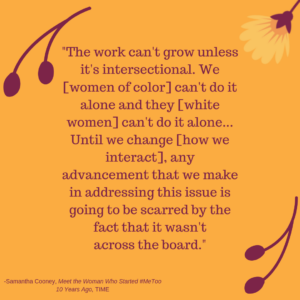
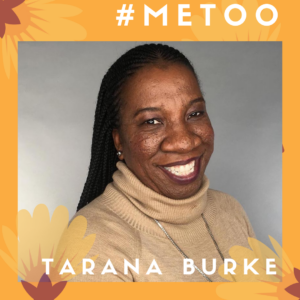
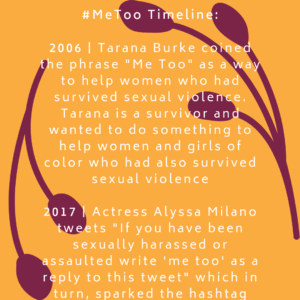
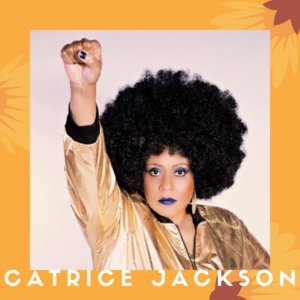
As Tarana Burke, founder of the #MeToo Movement, said: “Ending sexual violence [and harassment] will require every voice from every corner of the world and it will require those whose voices are most often heard to find ways to amplify those voices that often go unheard”
#WhatsNext? How can I, as a white woman, make sure that I am supporting women of color in the #MeToo movement?
The contributions and experiences of women of color, particularly black women, were ignored until the resurgence of #MeToo in 2017. Although it is important not to diminish the amazing work that the #metoo resurgence has done in helping survivors speak up and begin to heal, we also cannot ignore the fact that this movement exemplified an instance where a white woman was receiving credit for an idea originated ten years prior by a woman of color, Tarana Burke.
If your feminism is not intersectional, it is not feminism. Because of the resurgence of #MeToo, we have shifted from a society in which women did not feel empowered to report harassment (either out of fear of being disbelieved or out of a fear of being believed but ignored) to one where many women now feel they may both be heard and believed by those with power to effect change. With this, women of color are often left out of the narrative. Women of color are more vulnerable to sexual harassment than white women, and are less likely to be believed when they report harassment, assault, and rape. We need to understand the unique, racialized and gendered harassment experiences that women of color face. For white women wondering how to step up for women of color, participating in elections is a great step. Being an ally is “not a noun or something a person becomes”; you must be able to see yourself as part of the problem. As racial justice educator Catrice Jackson says, “one of the first things that white women allies need to do is to accept and own their own racism and begin to do their own, personal inner work to continuously uproot those racist behaviors and those implicit biases”. Whites women must step up for women of color; it is time all voices are heard.
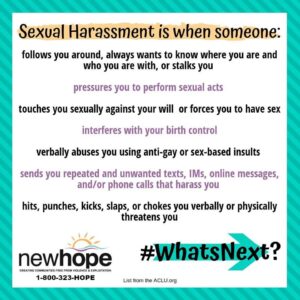
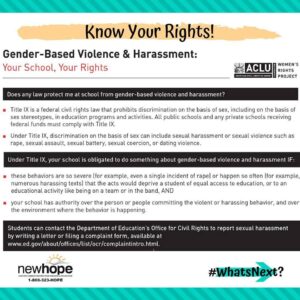
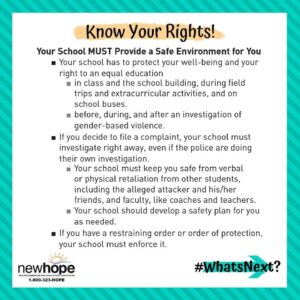
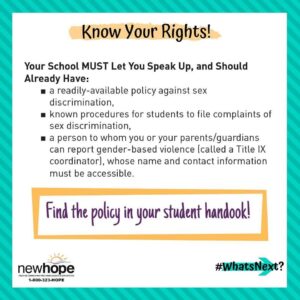
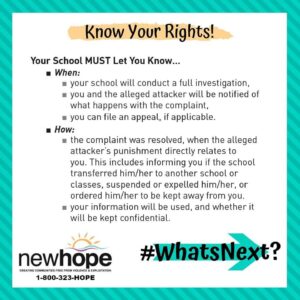
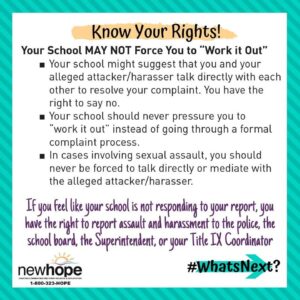
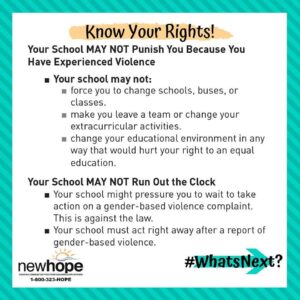
#WhatsNext if you are a student who has experienced sexual violence in your school setting! Much of the media coverage of the #MeToo movement has focused on adults, but teens experience sexual violence as well. According to [@theassociatedpress], between 2011 and 2015, there were 17,000 reports of sexual harassment of k-12 students by other students. **All Students should feel safe in their schools!** All schools that receive any funding from the federal government are to provide students protection from gender based harassment and violence under #TitleIX – even K – 12 schools. Check out this information from the ACLU about your CIVIL RIGHT to learn without facing harassment.
Topic #5 Accountability
How to I keep accountability on the person who perpetrated abuse and not the person who was abused?#WhatsNext? Accountable language is so important! Unaccountable language is conditioned into our psyche and is taught and learned as appropriate vocabulary. Changing language is not easy, but with practice and mindfulness, it can be achieved—and is so important to do! Unaccountable language can minimize the abuse, fail to take the abuse seriously, or hide the responsibility of the person who perpetrated abuse. Victim-blaming language reinforces stereotypes around domestic violence. Ways you can work towards creating communities where accountability is on the person who perpetrated abuse:
– challenge victim-blaming statements when you hear them
– do not agree with excuses for abusive behavior
– let survivors know it was not their fault#believesurvivors
– hold people who perpetrate abuse accountable for their actions (blaming the victim, alcohol, or drugs are NOT excuses)
– acknowledge survivors are their own best experts and provide them with resources and support (send them New Hope’s information!)
– avoid victim blaming in the media
– do not frame questions that are victim -blaming such as, “why did the victim stay?”
The disability rights movement has provided us with an objective way to communicate about individuals without reducing them to being about just one aspect of themselves.
Person-first language eliminates generalizations, assumptions, and stereotypes by focusing on the person rather than the part of their experience you may be speaking of.
It promotes understanding, respect, dignity, and positive outlooks.
#WhatsNext? How will you start using this model in your everyday life?
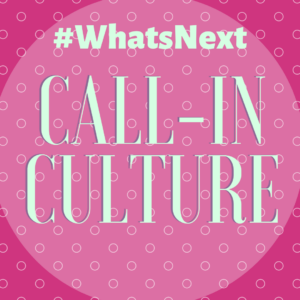
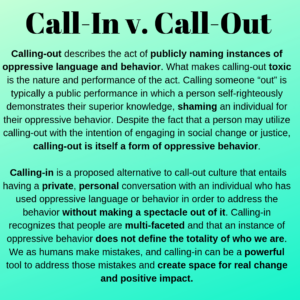
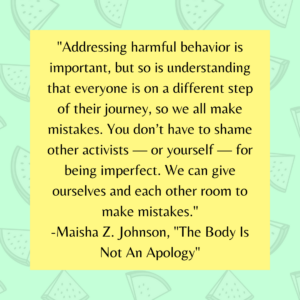
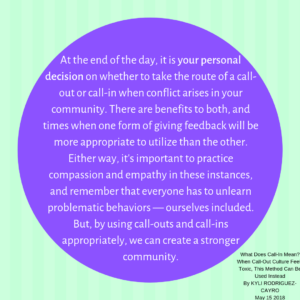
Thank you to everyone who followed along with our#WhatsNext #SAAM social media campaign!
To close out, we would like to talk about call-in culture. When having difficult conversations, think about if it will be more effective to call-in or call-out. Decide which method will create positive change and make sure your feedback is actually heard.
Did you enjoy our #saam2019 campaign and want to bring some of this education to your community, school, club, or organization? Bring the New Hope Education Team to your group! Email malerieg@new-hope.org for more information, or go directly to our INQUIRY FORM!
